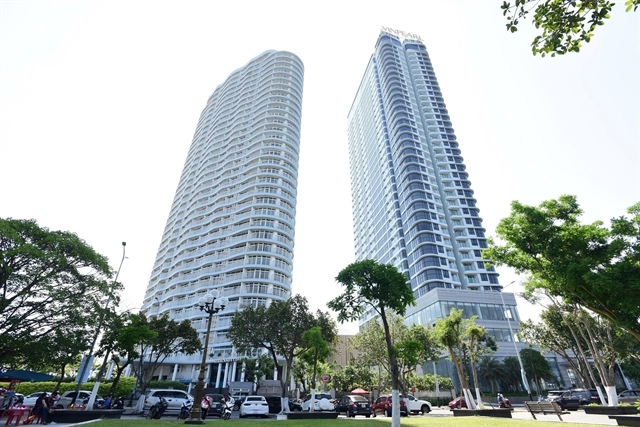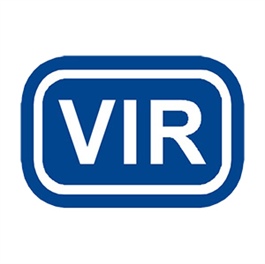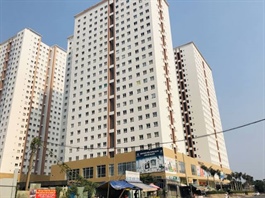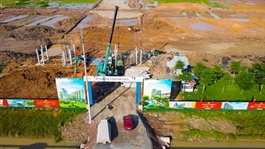Government moves to cool soaring housing prices
Government moves to cool soaring housing prices
Under a draft solution, three key mechanisms are raised, including restricting loans for buyers of second home or more, reserving at least 30 per cent of housing projects for affordable homes and requiring real estate transactions to be conducted through a trading centre.

A housing project in Đà Nẵng. Under the Ministry of Construction’s proposal, second-home buyers could borrow up to 50 per cent of the contract value, while those purchasing a third home or more would be limited to 30 per cent. VNA/VNS Photo Hải Âu |
The Ministry of Construction (MC) has proposed tightening lending rules to curb speculation and cool soaring housing prices, including capping loans for buyers of a second home at 50 per cent of the contract value and 30 per cent for a third home or more.
The proposal forms part of a draft government resolution on mechanisms to strengthen market controls and stabilise real estate prices, which the ministry recently submitted for public comment.
The draft highlights three key measures: restricting loans for buyers of a second home or more, developing affordable housing and requiring real estate transactions to take place through a State-run trading centre.
Under the draft, credit institutions operating in Việt Nam would be required to apply limits on loans for commercial house purchases, excluding social housing units. Second-home buyers could borrow up to 50 per cent of the contract value, while those purchasing a third home or more would be limited to 30 per cent.
The ministry also proposed that all real estate transactions be carried out through the State-managed online real estate and land-use rights trading centre to improve market transparency and curb speculation. The centre would serve as an electronic platform connecting relevant parties in transactions while monitoring and authenticating deals.
Provincial and municipal People’s Committees (administrations) would be required to allocate at least 30 per cent of commercial housing projects planned for 2026–30 to affordable housing.
Developers of affordable housing projects would receive certain incentives, including direct selection without bidding and streamlined procedures. These projects would be allowed a maximum profit margin of 20 per cent of total investment, including land use fees.
Homebuyers under lease-to-own contracts at these projects would not be permitted to transfer or resell their properties, in line with existing regulations aimed at preventing speculation.
The draft comes amid soaring property prices and growing concerns over speculation and affordability in major cities, as well as the need for healthy market development.
Housing prices outpace incomes
According to the MC, housing prices in cities such as Hà Nội and HCM City have risen sharply, far outpacing household income growth.
In HCM City, apartment prices have more than doubled since 2018, reaching up to VNĐ120 million (US$4,700) per square metre in the third quarter of this year.
In Hà Nội, prices of villas and townhouses have risen by 22–29 per cent annually, with some projects climbing by as much as 60 per cent.
By comparison, household incomes have grown by only 6–7 per cent per year, making homes increasingly unaffordable, particularly for middle- and low-income earners.
“Such increases are driven by speculation, unclear planning information and land hoarding rather than real housing demand,” the ministry wrote.
The ministry cited statistics showing that total outstanding loans in the real estate sector reached VNĐ3.99 quadrillion, up 14.6 per cent from the end of last year and accounting for nearly 23.3 per cent of total credit in the economy, with a bad debt ratio of 2.44 per cent.
Of these figures, housing loans accounted for the largest share at 57.3 per cent, up 16.7 per cent; land-related loans 20 per cent, up 10.7 per cent; real estate business loans 13.8 per cent, up 18.3 per cent; and tourism, resort and hospitality real estate 3.1 per cent.
The real estate market structure is highly imbalanced, according to the ministry. While mid- and high-end segments are abundant, affordable, social and rental housing remain in short supply.
At the same time, speculation and land hoarding have been fuelling price increases across many localities, particularly following announcements of new infrastructure or planning projects, which create negative impacts on the market.
Meanwhile, regulatory tools such as taxation, credit policy, urban planning, and land pricing remain inconsistent and have failed to keep pace with market developments.
“The consequence is that many people, especially labourers, young workers and civil servants in urban areas, face increasing difficulty in buying homes,” the ministry wrote.
The issuance of the resolution introducing measures to control and stabilise real estate prices had become pressing to promote stable and healthy market development, while also safeguarding social welfare and macroeconomic stability, the ministry stressed.
The ministry also said the draft was developed with reference to international experience in major markets such as Singapore, South Korea, China, Germany, and the US.
The real estate market exerts a significant influence on the macroeconomy and is closely linked to the financial and banking system as well as social security, according to the ministry.
When property prices become unaffordable, supply-demand imbalances can arise, posing threats to financial stability and social equality.
In many countries where housing prices surged beyond affordability, governments have implemented policies to regulate prices, ensure accessibility, control credit, and maintain sustainable growth.
Debate over credit curbs
Restricting lending for purchases of second homes might help curb speculation but could also dampen long-term investment flow and reduce overall market liquidity, said Giang Huỳnh from real estate services firm Savills HCM City.
Tightening credit in a market already struggling with prolonged supply shortages could further worsen existing challenges, Huỳnh said, adding that rising housing prices in recent years stemmed mainly from legal bottlenecks and rising costs rather than short-term speculation.
He suggested that the focus should be on speeding up project approvals and removing legal obstacles to unlock supply, while supporting demand through higher incomes and expanded preferential credit for low- and middle-income earners.
While curbing housing price increases is essential, it must be carried out with caution because not all markets are overheated, Nguyễn Vũ Cao, chairman of Khang Land, said.
Blanket credit restrictions or taxation policies that do not distinguish buyers or regions could undermine market momentum, he warned.
Đinh Thế Hiển, an economic expert, said that flexibility was important and that credit tightening must go hand in hand with the development of transparent corporate bond markets and policies for first-time housing purchases.
According to Phạm Thế Anh, head of the Economics Department at the National Economics University, real estate has been an attractive investment channel in Việt Nam for decades, pushing housing prices far beyond income growth.
Many countries use tools to control credit flow into the real estate market, such as loan-to-value ratios, debt-to-income limits, and credit growth limits.
Credit control should be combined with targeted taxation on short-term speculative trading, such as progressive taxes on multiple property ownership and regressive taxes on short holding periods.
Lê Xuân Nghĩa, another expert, said that credit control would be necessary but should not be the only solution and could not be applied indefinitely.
Việt Nam’s biggest housing problem was not pricing but the shortage of homes for low- and middle-income earners.
“The sustainable answer is to expand affordable housing supply,” Nghĩa said.
- 07:48 01/11/2025
























